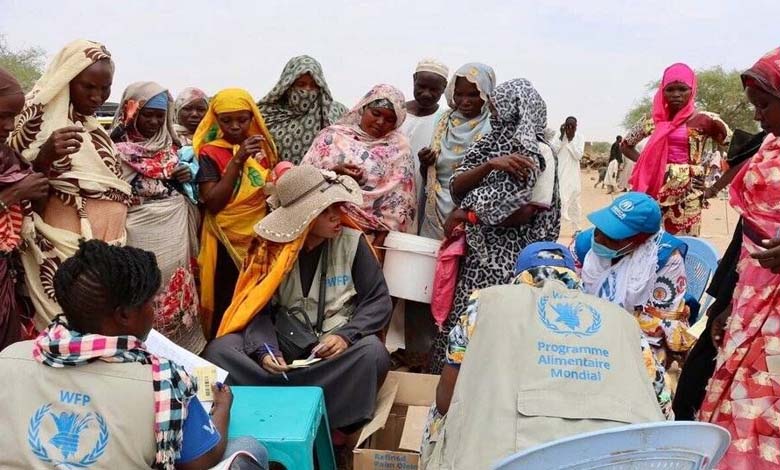World Food Program Hampered by Obstacles in Combating Hunger in Sudan
The program faces challenges in scaling up operations, funding shortages, and fraud prevention issues.

A recent internal report by the World Food Program (WFP) highlights serious issues in the United Nations agency’s response to the crisis in Sudan. These obstacles hinder its ability to alleviate hunger in the war-torn country and tarnish its reputation with donors.
-
Sudan Faces “Nightmare of Hunger”: 25 Million People in Need of Assistance
-
Hunger, conflict, and displacement… Death haunts Sudanese children everywhere
WFP is struggling to feed millions in the African nation, which is experiencing one of the worst hunger crises in the world. The report identifies several issues with the program’s response in Sudan, including its inability to scale up operations, lack of funding opportunities, and what the report describes as “fraud prevention challenges.”
The report results from an evaluation conducted by WFP’s Regional Emergency Coordination Team in July and August. The team was tasked with assisting the program in expanding its operations in Sudan and neighboring countries. The findings are detailed in a confidential five-page document, dated August 30, titled “Diagnostic Report of the Regional Emergency Coordination,” marked as classified.
-
The Sudanese are facing hunger after the halt of their salaries
-
The Food War… Sudanese Face Conflict and Hunger
The report describes Sudan as WFP’s largest emergency.
This news comes as WFP seeks billions of dollars to address hunger worldwide and grapples with a trust deficit from the United States and other major donors.
In Sudan, a country of 50 million people, nearly half the population is estimated to be severely hungry amidst a civil war that erupted in April 2023. Hundreds are believed to die daily due to hunger and related diseases.
Regarding operations in Sudan, the report states, “The reputation of WFP in rapid emergency response has been damaged… Major stakeholders, including key donors, now demand tangible progress before pledging additional funding.”
-
Sudan – Terrifying numbers on hunger and malnutrition rates
-
Sudan War: The Flames Encircle El-Fasher from All Sides and ‘Path of Hope’
WFP Deputy Executive Director Carl Skau did not elaborate on the report when asked about it but told Reuters that the program and other humanitarian organizations were unprepared for the sudden crisis in Sudan.
“It took a long time for us to regain our footing and deliver aid effectively, efficiently, and in an organized manner,” Skau said in an interview in Cairo on Monday. “I am confident that WFP is now fully operational and doing everything possible.”
A November report by the United Nations Development Program stated that nearly half of Sudan’s population, around 26 million people, face food insecurity, with increasing famine risks across the country.
-
Sudan Crisis: What are the Motivations behind the Ministerial Changes and Their Expected Outcomes?
-
Catastrophic Consequences… Millions of Sudanese Children Pay the Price of War. What’s the Story?
The report highlighted that the ongoing conflict, which has lasted 19 months, has significantly worsened economic and social conditions. Access to healthcare services, for instance, has dropped to 15.5% from 78% before the war.
Regarding displacement, the UN reported that the number of displaced people has exceeded 11 million, mostly women and children. The need for urgent humanitarian aid is growing, especially as access to some conflict zones remains challenging.
Despite reopening the Adré border crossing with Chad in August, allowing “over 300 trucks” to deliver aid to 1.3 million people, humanitarian assistance to conflict areas remains “insufficient,” with “some regions still inaccessible,” according to the report.
-
Sudanese Analyst Reveals: Pressure Must Be Applied to Ensure the Flow of Humanitarian Aid
-
After 500 Days of War… A Major Health and Food Crisis Facing Sudan
Ramesh Rajasingham, Director of the UN Office for the Coordination of Humanitarian Affairs, described the conflict as causing “immense suffering” and warned of “unprecedented levels of mortality.”
Addressing the Security Council, Rajasingham said, “The conflict in Sudan threatens to escalate further,” noting that intensifying military actions on both sides could lead to severe consequences for civilians already suffering from food and security shortages.
The report indicates that the confrontations have so far resulted in thousands of deaths and millions displaced. Massacres and sexual violence have become horrifying features of this conflict.
-
War and Famine: Sudan’s conflict drives Darfur to the brink
-
Sudan: The Muslim Brotherhood Inflames the Situation in Khartoum
Under-Secretary-General for Political Affairs Rosemary DiCarlo expressed concern over the potential resumption of intense military operations at the end of the rainy season. She noted that both the army and the Rapid Support Forces remain convinced of their ability to achieve victory, despite the humanitarian crisis caused by the war.












